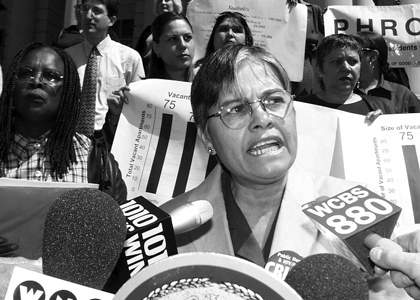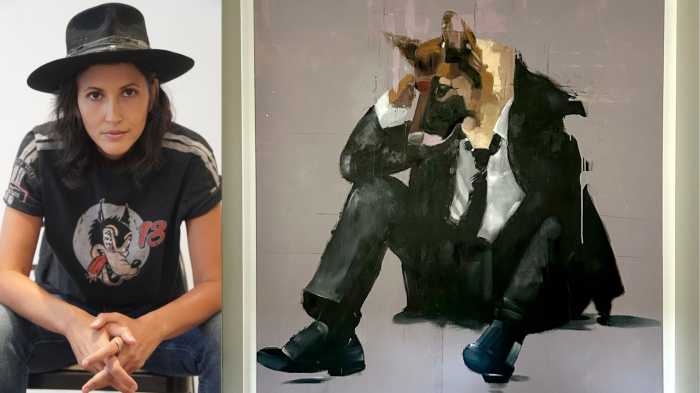By Lincoln Anderson
After more than four years, the Campaign Finance Board last Thursday finally wrapped up its audit of former City Councilmember Margarita Lopez’s finances from her 2001 re-election campaign.
In the end, the finance board determined that Lopez’s 2001 campaign “improperly converted public funds by making impermissible post-election expenditures and material misrepresentations.”
C.F.B. found the Lopez ’01 campaign to be “in breach of certification” and thus ineligible for public funds, and required the campaign to repay the $139,000 in public funds it received. In addition, the board fined the Lopez ’01 campaign $10,000 for making approximately $45,000 in impermissible post-election payments to individuals; $5,000 for making an impermissible post-election payment of $1,350 to AHONA Housing Development Fund Corporation (the E. 11th St. co-op building in which Lopez has an apartment, where the Lopez campaign said they had an office for two months); and $5,000 each for material misrepresentations relating to post-election payments to individuals, AHONA and campaign workers. The Lopez ’01 campaign was also fined $1,000 for failure to maintain and provide copies of checks and $180 for accepting a contribution from an unregistered political committee.
In effect, Lopez ended up being “fined” about $170,000 — or $16,000 less than the $186,000 she was required to pay the finance board last August as “a protection to taxpayers” in order for C.F.B. to release her public matching funds for her 2005 Manhattan borough president campaign. The $186,000 payment — $166,000 of which was loaned to Lopez by 10 friends and supporters — covered the public matching funds she received in 2001 from C.F.B., plus all potential penalties she faced. Lopez will get back the $16,000 — but C.F.B. will keep the $170,000.
Under the city’s campaign finance program, candidates who don’t exceed a fundraising cap are awarded $4 by the city for every $1 they raise. However, the matching funds can only be spent on qualified expenses that are properly documented by the campaign, and after the election, any unspent public funds are supposed to be returned to the city’s coffers.
Neither Lopez nor any of her supporters were present as the final determination was read aloud at the finance board last Thursday. The Lopez ’01 campaign’s attorney, Jerry Goldfeder, sat silently listening to the ruling, then gathered his briefcase and coat and left.
Lopez did not return calls for comment for this article.
If there was an upside for Lopez to the board’s verdict, it was that the most serious allegation — fraud — was noticeably absent from the decision. Last November, The Villager reported that C.F.B. had stated at a public hearing that it was investigating the Lopez ’01 campaign for “apparent fraud and misrepresentation.”
Clearly, the fraud allegation was the most disturbing to Lopez. During the campaign’s last opportunity to testify publicly, at a Jan. 12 C.F.B. hearing, the former District 2 councilmember — who had to leave the City Council at the end of last year because of term limits — didn’t hide her outrage.
“My name have been put through the mud,” Lopez told the finance board members. “I’m sorry, but my name have been put in my community like I’ve been committing fraud in here and that is simply not true…. To accuse me of fraud, those are major words and you need to be careful when you use that and you put it out there.”
Lopez blasted the finance board’s staff for having told The Villager in November that she was being investigated for fraud. Apparently referring to a Nov. 2 Villager headline that, admittedly, was too heavy-handed and anticipatory — “Finance board ready to fine Lopez for fraud in 2001 race” — she accused either the C.F.B. staff or The Villager of “lying” that she was going to be “indicted” (though The Villager article never used the word).
“To say that it’s conspiracy, to say that it’s fraud and reporters coming in here and the members of the staff of the board are talking to those reporters telling them that I’m going to be indicted,” Lopez said. “Those words were used by Mr. Lincoln Anderson who put [it] in the newspapers, in the local newspapers, that I was going to be indicted…. This is the way that this whole procedure was used to destroy my reputation.”
‘Meat for the media’
Attorney Goldfeder added, “The allegation of fraud and misrepresentation, of course, that is the meat that the media likes to pick up — that Margarita Lopez has been charged with fraud and misrepresentation…. Those are the kind of allegations that are so troubling to Ms. Lopez.”
Asked why fraud was dropped from the decision, Kate Schachern, a C.F.B. spokesperson, said, “The original range of conclusions the board could have reached included fraud and material misrepresentation. The conclusion the board did reach was a finding of material misrepresentation.” Schachern didn’t elaborate on what the deciding factor was for why the decision didn’t rise to the level of fraud.
Lopez’s campaign treasurer in 2001 was Ann Johnson, a tax accountant who is a former chairperson of Community Board 3. At the Jan. 12 hearing, Johnson also laid into the C.F.B. board members.
“Margarita and I have both been slandered by you,” Johnson said. “And for you to imply that somehow we were trying to cheat you or that I would malign my own reputation by doing anything illegal is so preposterous that I can’t begin to tell you. For four years you raked me over the coals. Four years of my life.”
Goldfeder said “95 percent” of the disputed late payments were for small amounts of money for people working on Election Day.
However, the finance board, among other things, zeroed in on two sets of checks issued by the campaign. Although all the checks were dated Nov. 6, 2001, the date of the general election, half of the checks with a pattern of early serial numbers were cashed immediately after that date, while another batch with a later pattern of serial numbers — in some cases, received by the same people who cashed the other checks quickly — were deposited significantly later, in some cases as late as February. These laggardly checks raised red flags for the finance board, leading them to suspect the Lopez campaign cut them sometime after the election.
“I can tell you that I wrote the checks on the day of the check [when it was dated],” Johnson said. “I have a witness who sat there and watched me get writer’s cramp doing this.”
Maxine Fee, a campaign volunteer, testified that she saw Johnson writing checks to campaign workers on Election Day, as Lopez stood next to her telling her how much to pay them.
“Ann Johnson was writing checks all day long like a maniac that day,” Lopez echoed.
Goldfeder said people had their reasons for not depositing their payments promptly, from simply “putting it aside” to “misplacing it.”
Volunteer spilled beans
However, last November, Philip Van Aver — a Lopez ’01 campaign volunteer who only volunteered during the primary election — told The Villager he had been surprised to receive a $300 check from the Lopez campaign in February 2002, three months after the general election. Plus, since he had only been a volunteer, he hadn’t even been expecting any payment. The campaign finance law draws a clear line between workers and volunteers, the latter whom are not allowed to be paid.
Susan Stetzer, a former co-president of Coalition for a District Alternative, Lopez’s political club, and current district manager of C.B. 3, also let slip to The Villager that she had been surprised to receive a check after the 2001 election for merely “helping out” on the campaign.
Yet, at the Jan. 12 hearing, former Lopez campaign members offered a variety of reasons why they cashed their checks so late.
Georgina Christ, Lopez’s ’01 volunteer coordinator, explained that the $2,500 check she received was cashed so tardily because it was held two to three weeks by Johnson, whom Christ said had called her, saying a “seven looked like a four or a four looked like a seven on my Social Security number. And there seemed to be a discrepancy so she wanted to clarify [that] before she sent me the check.”
Amy Velez, a former Community School Board 1 member who participated in the Lopez ’01 campaign, said of why she took so long to cash her check, “Well, I have to say that this is part of my culture…. I am not very good with to put the checks, you know, at the right time.”
Betty Brassell, another Lopez campaign worker, recalled she was mailed one check and handed another.
“I can tell you that when I receive mail I don’t necessarily look at it right away,” she said. “I try to scan through it…. Paperwork is one of my worst enemies.”
Harriet Putterman testified it took her awhile to take her check to her bank, Amalgamated, because it doesn’t have as many branches as others.
“It’s not like Chase. It’s not like Citibank,” she said. “So I have to walk 10, 15 blocks and I start carrying my checks around. That’s why I have direct deposit now.”
Catherine Cook, another campaign worker, said, “I work at Columbia, so for me to stop, you know, and get to the bank at some point is not always possible for a good amount of time. [The check] could sit in my purse. I don’t always open my mail because of all the junk mail that I get.”
‘It’s a cultural thing’
Said Goldfeder of this pattern of widespread late-check cashing by Lower East Siders, “I think you need to accept that it appears to be a cultural thing among this group.”
At one point, Goldfeder asked for a show of hands of Lopez witnesses: “If people could raise their hands who else got checks and would testify that they delayed in doing [cashing them] because that’s just the way, you know, it is.”
Lopez added that sometimes they had to deliver the checks by hand, and it wasn’t always easy to track down people. One woman, for example, went back to the Dominican Republic, she noted. Lopez also said that the 9/11 terrorist attacks played havoc with mail delivery — even two months afterwards — and that her campaign had transformed, in part, into an emergency-relief corps.
“In our area we run out of milk, bread and fundamentals,” Lopez explained. “We have to use the volunteers and the workers to turn the entire campaign into feeding all of those people who are in the areas of the projects and Section 8.”
Goldfeder further argued that Lopez and her campaign didn’t see a sharp distinction between workers and volunteers.
“In her mind and in the mind of the people in this campaign,” he said, “the way they understood the use of this term was not the same as, generally speaking, the way the C.F.B. makes a bright line between volunteers and those who are paid.”
Arguing the very term is ambiguous, Goldfeder queried the finance board: “Is a volunteer Army in the United States paid?”
Grassroots, not pros
Lopez added that C.F.B. had to take into account that her campaign was “grassroots,” and that’s the only way that she knows of to run her campaigns, and the only way they can be run.
“My campaigns are not run by professionals,” she said. “The campaigns that I always run have been run by the people in the community. Sometime they get paid for work that they do because they lose a day of work and sometime they don’t. And they understand that as part of the way that we do the campaigning. But it’s not that somebody is doing some hanky-panky here…to pull money out of the Campaign Finance Board.
“If you want the legal meaning of things to be applied to every campaign, you have to tell us that,” Lopez said. “You have to tell us that we have to sign contracts [for campaign workers]. You have to tell us that we have to do things a certain way.”
Every campaign participating in the finance program receives a rulebook outlining the program’s rules.
Michael Rosen was among those who loaned Lopez money so she could pay the finance board the $186,000 bond last August to get her $382,000 in matching funds for her borough president primary race last year, in which she finished third. As collateral for the loan from the 10 individuals, Lopez apparently put up the mortgage on her Sullivan County country house and, if needed, the mortgage on her E. 11th St. apartment, too.
Rosen, a founding member of the East Village Community Coalition, said Lopez repaid his $15,000 loan quite a while ago and that others who participated in the loan were also repaid.
“Margarita is one of the most extraordinary people I know,” Rosen said. “She keeps her word to the letter. And I’ve never seen her do anything motivated by personal gain. All I know is that I participated in a loan that she paid back. However she did it, she did it. She promised us that she would pay it back and she did…. I felt she was a friend who needed the help of her friends. That’s what friendship is.”
Frances Goldin, who gave Lopez a $10,000 loan, said she’d gladly do it again.
“She repaid everybody who loaned her money,” Goldin said. “I don’t know what she’s going to do — sell her house or something. I think she’s going to acquit herself as she goes, because she’s a very good person. I think the people on the Lower East Side who were upset with her because she supported Bloomberg [in the mayor’s race] will forgive her. And we all make mistakes. No one’s perfect.”
A pair of political consultants, Hank Sheinkopf and George Arzt — both Democrats, like Lopez — downplayed the significance of the finance board’s action.
“On what grounds do they have to say that?” said Sheinkopf of the material misrepresentations charges against Lopez, noting that C.F.B “has no enforcement authority.” “What does it mean in the long term? Nothing. One: The only people that would be upset are the people that loaned her money. Two: If she runs for public office, it could be used against her.”
Arzt said, “Even though it’s a steep fine, people are fined all the time — candidates and incumbents, for that matter. She mortgaged her home, I think, to pay back her friends and I think that’s very admirable. I don’t think it will impede her career in the future. Most people don’t understand campaign finance — it doesn’t filter through to the public.”
Goldfeder, the Lopez campaign’s attorney, said Lopez herself was cleared of wrongdoing.
“We were very pleased that Margarita Lopez personally was exonerated of any wrongdoing,” he told The Villager. “ And the findings of the Campaign Finance Board against the campaign workers are completely devoid of any basis in fact.”
He said the Lopez 2001 campaign is considering appealing the C.F.B.’s decision in court.






































